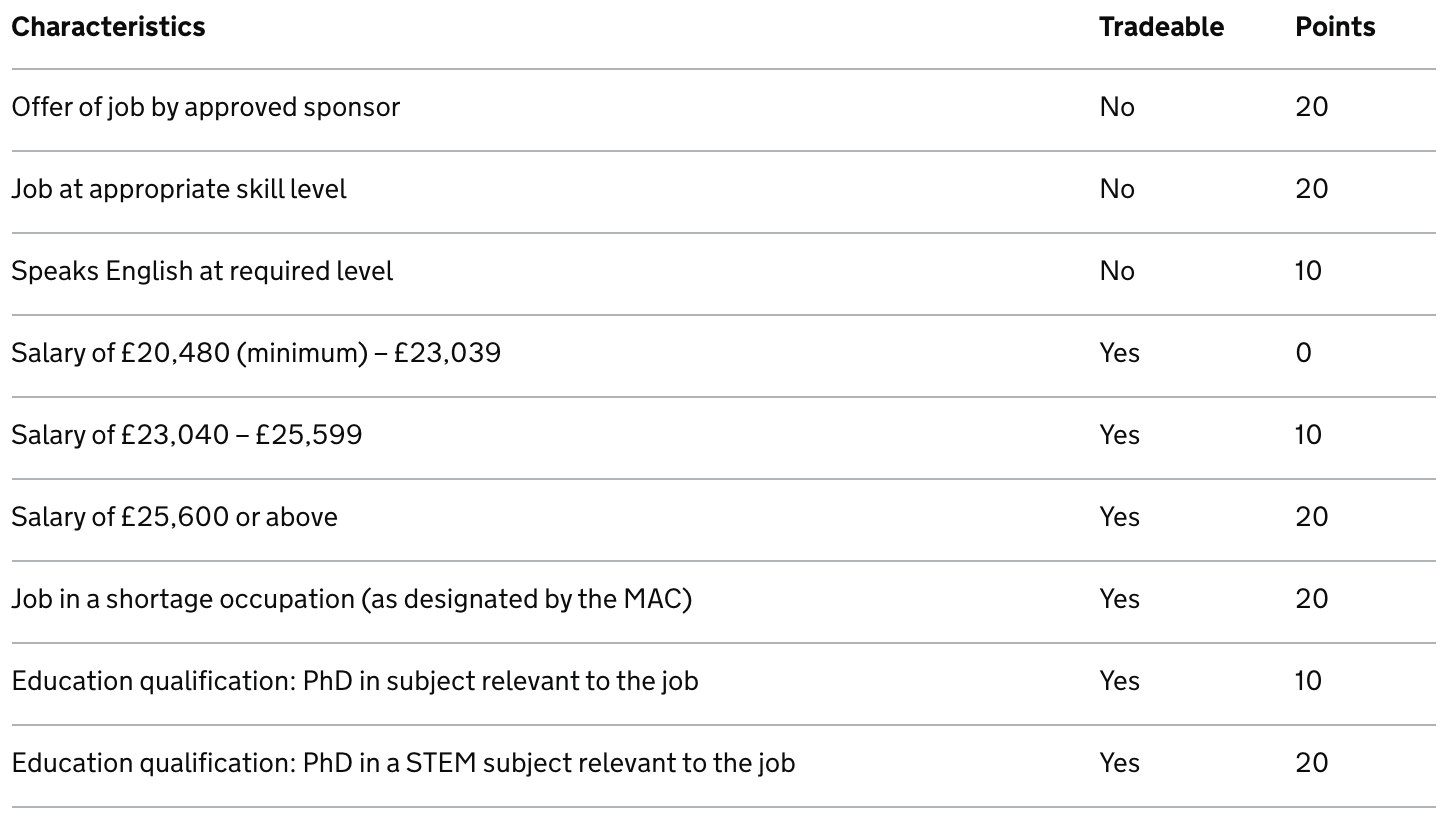
An Australian Style Immigration System Is Just What This Country Needs
20th February 2020
Yesterday the government announced the details of its most prominent policy outside of Brexit, immigration reform. Now that the totality of immigration will come under our purview they have decided to treat EU and non-EU nationals equally with an emphasis on attracting only the highest skilled migrants via a points system similar to Australia.
Now before I continue I must declare an interest. I lived and worked in Australia for 5 years and am now an Australian citizen so I am intimately familiar with how their system works and have very much been a fan of it. The proposed reforms are very similar to the Australian system in the fact that everyone from around the world is treated the same but it’s also rather different in a few key areas.

Under the current British proposals applicants will have to reach 70 points to qualify for a visa out of 9 criteria, 3 of which are compulsory. The compulsory categories comprise 50 of the 70 points required to qualify and to get this a prospective arrival would need to have a job offer, be of a certain skill level and speak English to an acceptable standard. The remaining 20 points can be made up if their job offer pays over pays over £25,600 per year, if their job is considered a shortage occupation or if they hold a PhD (10 points if their PhD is job related but 20 if their PhD is in a STEM field). The clear focus on these plans are to prioritise high skilled workers in order to foster a “high wage, high skill, high productivity economy” however there is an acknowledgment of the need for seasonal workers in agriculture with the provision of 10,000 temporary work permits for this purpose.
The Australian system is slightly different in a number of ways. Rather than one system like the government has proposed there are broadly two systems, one for skilled individuals moving long term and one for temporary workers sponsored by their employers. For the skilled individuals you can either apply by yourself, get sponsored by an employer or sponsored by a State Government. To be eligible you must attain 65 points which are awarded based on your age, qualifications, work experience, English language ability etc. but unlike the prospective British system none of these are compulsory, hit the points, pay the fee and you’re in. For a temporary worker (the visa I initially went there on) it’s much more straightforward, find a sponsor, get some health insurance, show you can speak English, have the right skills and off you go.
Comparing the two, the British proposals appear to be more strict with the compulsory elements making up the bulk of the qualification criteria whereas the Australian one is a bit more open. The British one is also slightly more prescriptive on its “salary threshold” however the Australian one does have salary requirements but they are of a more indirect nature. For example on the Aussie temporary worker visa the government sets minimum salaries that must be paid to an temporary worker brought from overseas by the sponsor based on their job classification, so that say a private clinic doesn’t just import foreign nurses and pay them minimum wage. They both however share a common factor, a desire for the skilled.
This is the crux of the reforms, due to EU Freedom of Movement a number of sectors have become overly reliant on low wage, low skilled migrant labour. As a result this has had a dampening effect on UK productivity with a near unlimited source of labour creating a huge disincentive to invest in new equipment or upskilling of employees. Another side effect has also been increased competition at the lower end of the labour market resulting in a downward pressure on wages, essentially creating a buyers market for employers. The government is very much aware of this saying that “we need to shift the focus of our economy away from a reliance on cheap labour from Europe” and that “employers will need to adjust”. This new order will turn the incentives of the past on their head, no longer will certain businesses be able to take the easy way out, they will have to invest in, retain and train their existing staff if they want to be competitive.
The subsequent reaction to the government’s announcement from industry groups, trade unions and political commentators has ranged from nakedly self serving to downright insulting with the usual rhetorical question of “Who’s going to serve me my coffee?”. Well in Australia the answer to that question is “Most likely an Aussie” and the under similar conditions in the UK, that these reforms would bring about, it's not unreasonable to assume Brits will end up in such jobs. There is plenty of scope for this already, the Home Secretary, Priti Patel, pointed out yesterday that there are over 8 million people economically inactive in this country so workers can be found to fill these roles.
The usual retort to this was the ever patronising stock response of “But Brits don’t want to do those jobs”. Again Australia shows this to be utter rubbish, in my time there I don’t think I ever heard anyone make that argument once. Aussies do want to do “those jobs” and to attract them employers frequently pay in excess of the minimum wage, the free market still applies. Case in point a friend of mine’s mum works in a food processing plant for the local equivalent of Bernard Matthews and she manages to make a decent living. If the pay is right, people will take the work wherever it is.
The reaction from various quarters here in Northern Ireland was doubly hollow with the characteristic prophecies of economic doom at even the hint of change. Yet again I’d say look to Australia, they have 23 million people, very limited low skilled immigration, an economic inactivity rate of ~15% and like us have vibrant retail, farming and food processing sectors. In Northern Ireland we have just 1.8 million people and an economic inactivity rate of ~25% (the highest in the UK but going down) so I think we’ll be just fine going forward. They can manage Down Under, we can more than manage here.
These reforms are just what we need as we take our first steps out of the European Union. They allow us to attract the best and the brightest from all over the world, help with our productivity problems and give a boost to the bargaining power of workers. Believe it or not there is another way of doing things, I’ve seen it and works rather well.
